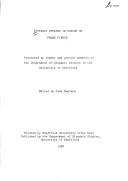| Listing 1 - 4 of 4 |
Sort by
|
Book
ISBN: 1501758039 1609091590 9781609091590 0875804861 0875807062 Year: 2014 Publisher: DeKalb Northern Illinois University Press
Abstract | Keywords | Export | Availability | Bookmark
 Loading...
Loading...Choose an application
- Reference Manager
- EndNote
- RefWorks (Direct export to RefWorks)
One hundred and fifty years after Kansas was admitted to the Union, we still find ourselves fascinated by the specter of "Bleeding Kansas" and the violence that preceded the American Civil War by five years. Although ample attention has been devoted to understanding why territorial violence broke out in Kansas in 1856, of equal concern but less illuminated is the question of why government, both local and national, allowed the violence to continue unstanched for so long. This question is fundamentally about governance-its existence, exercise, limits, and continuance-and its study has ramifications for understanding both Kansas events and why the American experiment in government failed in 1861. In addition, the book also sheds light on the nature of democracy, the challenges of implanting it in distant environs, the necessity of cooperation at the various levels of government, and the value of strong leadership. To Govern the Devil in Hell uses the prism of governance to investigate what went wrong in territorial Kansas. From the first elections in late 1854 and early 1855, local government was tarnished with cries of illegitimacy that territorial officials could not ameliorate. Soon after, a shadow government was created which further impeded local management of territorial challenges. Ultimately, this book addresses why Presidents Franklin Pierce and James Buchanan failed to act, what hindered Congress from stepping into the void, and why and how the lack of effective governance harmed Kansas and later the United States.

ISBN: 095070170X Year: 1980 Publisher: Sheffield University-Department of Hispanic Studies
Abstract | Keywords | Export | Availability | Bookmark
 Loading...
Loading...Choose an application
- Reference Manager
- EndNote
- RefWorks (Direct export to RefWorks)
Spanish American literature --- Spanish literature --- History and criticism --- History and criticism. --- Pierce, Frank, --- Spaanse studies. (Feestbundel Franklin Pierce) --- Pierce (Franklin). (Mélanges) --- Hispaniques (Etudes). (Mélanges Franklin Pierce) --- Pierce (Franklin). (Feestbundel)
Book
ISBN: 0817387455 9780817387457 9780817318222 0817318224 Year: 2014 Publisher: Tuscaloosa
Abstract | Keywords | Export | Availability | Bookmark
 Loading...
Loading...Choose an application
- Reference Manager
- EndNote
- RefWorks (Direct export to RefWorks)
Informed by thousands of pages of newly released FBI files, The Kidnapping and Murder of Little Skeegie Cash tells the gripping story of the only crime investigated by J. Edgar Hoover himself, the sensational 1938 murder of a five-year-old boy from the Florida Everglades.In his long and storied career, J. Edgar Hoover investigated only one case personally, the 1938 kidnapping and murder of five-year-old Floridian James "Skeegie" Cash. What prompted the director himself to fly from Washington, DC, to a rain-drenched hamlet on the edge of the Everglades? Congress had slashed
Murder --- Kidnapping --- Criminal homicide --- Killing (Murder) --- Homicide --- Abduction of children --- Child abduction --- Child snatching --- Kidnaping --- Offenses against the person --- Investigation --- History. --- McCall, Franklin Pierce. --- Cash, James Bailey,
Book
ISBN: 1299464815 1400846412 9781400846412 9781299464810 9780691151991 0691151997 0691166617 Year: 2013 Publisher: Princeton : Princeton University Press,
Abstract | Keywords | Export | Availability | Bookmark
 Loading...
Loading...Choose an application
- Reference Manager
- EndNote
- RefWorks (Direct export to RefWorks)
The United States witnessed an unprecedented failure of its political system in the mid-nineteenth century, resulting in a disastrous civil war that claimed the lives of an estimated 750,000 Americans. In his other acclaimed books about the American presidency, Fred Greenstein assesses the personal strengths and weaknesses of presidents from George Washington to Barack Obama. Here, he evaluates the leadership styles of the Civil War-era presidents. Using his trademark no-nonsense approach, Greenstein looks at the presidential qualities of James K. Polk, Zachary Taylor, Millard Fillmore, Franklin Pierce, James Buchanan, and Abraham Lincoln. For each president, he provides a concise history of the man's life and presidency, and evaluates him in the areas of public communication, organizational capacity, political skill, policy vision, cognitive style, and emotional intelligence. Greenstein sheds light on why Buchanan is justly ranked as perhaps the worst president in the nation's history, how Pierce helped set the stage for the collapse of the Union and the bloodiest war America had ever experienced, and why Lincoln is still considered the consummate American leader to this day. Presidents and the Dissolution of the Union reveals what enabled some of these presidents, like Lincoln and Polk, to meet the challenges of their times--and what caused others to fail.
HISTORY / United States / Civil War Period (1850-1877) --- HISTORY / United States / 19th Century --- POLITICAL SCIENCE / Political Process / Leadership --- POLITICAL SCIENCE / Government / Executive Branch --- Political leadership --- Presidents --- Presidency --- Heads of state --- Executive power --- History --- United States --- Politics and government --- Abraham Lincoln. --- American Civil War. --- American presidency. --- American presidents. --- Barack Obama. --- California purchase. --- Democratic Party. --- Franklin Pierce. --- Fugitive Slave Act. --- George Washington. --- James Buchanan. --- James K. Polk. --- Mexican Cession. --- MexicanЁmerican War. --- Millard Fillmore. --- Oregon Territory. --- Zachary Taylor. --- cognitive style. --- emotional intelligence. --- leadership. --- organizational capacity. --- policy vision. --- political skill. --- public communication. --- slavery. --- tariff reduction.
| Listing 1 - 4 of 4 |
Sort by
|

 Search
Search Feedback
Feedback About UniCat
About UniCat  Help
Help News
News